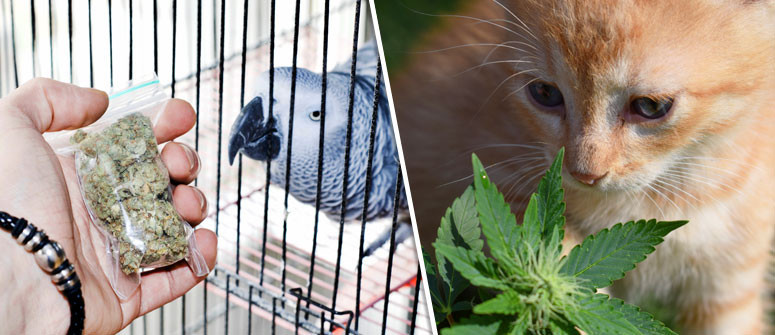Can your pets benefit from medical marijuana?

From relieving pain to boosting appetite and even reducing seizures, medical marijuana for pets may be an extremely effective alternative to regular medicine.
We’ve heard a lot about the medical potential of cannabis over the last years. Numerous studies are showing that the active compounds in cannabis (such as THC and CBD) are effective in treating everything from pain and anxiety to PTSD and cancer.
More recently, stories of pet owners using medical marijuana and cannabis-derived products on their pets have made headlines. And with good reason, seeing as elderly pets such as cats and dogs suffer from many of the same conditions as elderly humans, including arthritis, loss of appetite, and seizures.
WHAT IS MEDICAL MARIJUANA FOR PETS?
Medical marijuana for pets isn’t much different to the medical cannabis prescribed to humans. It is a term that refers to a wide variety of products derived from the cannabis plant. To better understand medical cannabis for pets, it's important to understand the science behind cannabis and its medicinal properties.
Cannabis contains over 100 active compounds known as cannabinoids. Arguably the two most renowned cannabinoids are THC (tetrahydrocannabinol) and CBD (cannabidiol). THC is a psychoactive compound and has been shown to help relieve pain, treat nausea and vomiting, stimulate appetite, relieve insomnia, and even help repress traumatic memories in patients suffering from PTSD. CBD, on the other hand, isn’t psychoactive, and has been shown to relieve seizures, act as a neuroprotectant, inhibit the growth of cancer cells, and much more.
When we consume cannabis, these cannabinoids interact with our endocannabinoid system (or ECS). This system combines a group of receptors located in the brain and throughout the central and peripheral nervous systems. The endocannabinoid system is involved in managing various physiological processes including appetite, pain-sensation, mood, memory, and more.
But the endocannabinoid system isn’t unique to humans. Most mammals have cannabis receptors in their body and therefore react to cannabis in similar ways we do. The same happens to other mammals. Some animals that have endocannabinoid systems include cats, dogs, pigs, racoons, and skunks, among others.
Medical marijuana for pets generally comes in edible forms, including biscuits, soft chews, and more. However, tinctures are often considered the best type of medical cannabis as they can easily be administered to a pet using a syringe or dropper and are quickly absorbed through the oral mucus membrane.
WHAT DOES SCIENCE SAY?

Very little scientific research has gone into the efficiency and legitimacy of medical marijuana for pets. However, many studies have focused on mice or rats, which is good news for any rat or mice owners.
Most of the evidence for medical marijuana’s efficiency in treating the ailment of a furry loved one is based on studies that examine the drug’s potential in treating human conditions. Most owners who decide to give their pets cannabis-based medicine do so based on the assumption that medical marijuana will offer their pet similar relieve like it would a human being.
The amount of anecdotal evidence in favour of medical cannabis for pets is growing. An article from the New York Times, for example, included several. Lisa Mastramico, for example, uses edible oils to treat her 12-year-old cat’s arthritis.
“When I’ve given it to her, she’s never acted high...She comes out and socializes, wants to be in your lap, wants to be petted. It’s a very noticeable difference,” Ms Mastramico, hose cat used to hide out in the closet, told the NYT
Maria Ellis Perez, on the other hand, feeds hemp chews to Ricochet, her 12-year-old female skunk who limps, has cataracts, and refused to eat. After a few days nibbling the hemp-derived treats, Ms Perez also mentioned a notable difference. “She was turning her head and looking up with the good eye. She showed up for breakfast,” Ms Perez said.
Cate Norton, who works at a animal rescue shelter, also uses medical marijuana to treat her 3-year-old Rottweiler’s seizures and anxiety. In just 8 months, Ms Norton has noted an extreme reduction in her dog’s seizures.
Anecdotal evidence obviously has its limitations. And while the stories of Ms Mastramico, Ms Perez, and Ms Norton might not be enough to completely legitimize medical marijuana for pets, they definitely make a strong case for more in-depth, legitimate scientific research into its effectiveness.
CAN CANNABIS BE DANGEROUS FOR PETS?
It’s very important to realize that pets are extremely sensitive to cannabis and, in particular, to THC. Horror stories of pets breaking into their owner's stash or stealing a cannabis-infused edible and ending up in the emergency room are real and can be a extremely traumatic and dangerous.
The overconsumption of THC can cause serious health effects in pets. Signs of over consumption can include vomiting, diarrhea, trouble with equilibrium, or seeming zoned-out. To avoid these risks, owners are advised to:
- Always store any cannabis or cannabis-derived product well out of reach from your pets.
- Opt for products that are low in THC.
- Be extremely careful when it comes to dosing. Don’t try to calculate a dosis for your pet based on an average human dosage.
- Use tinctures or other products where dosage is clear and simple.
Because pets are extremely sensitive to THC, it may be worth exploring hemp-based products instead of those derived from cannabis. Hemp-based medicine is typically low in THC and can still offer effective relief from a variety of conditions. Hemp products are also legal in all 50 states in the US and various other places around the world.
IS MEDICAL MARIJUANA FOR PETS LEGAL? HOW CAN I GET IT?

The legality of medical marijuana for pets varies. Most of the stories about medical marijuana featured in this article and other news sources take place in the US where, despite being legal in 29 states and Washington DC, it still isn’t available for pets.
The fact that cannabis remains a Schedule 1 drug in the US means vets cannot prescribe it. In fact, simply mentioning or discussing the use of medical cannabis for pets puts a vet at risk of losing his/her license.
Vets cannot talk about medical marijuana in a setting where they are giving medical advice. In a setting where they are giving general information, things get a little less risky. However, most vets will be wary about discussing the subject altogether.
There is little information about the legality of medical cannabis in other parts of the world. If you’re a vet based outside of the US, always make sure to get valid legal information about the topic before discussing cannabis with pet owners.
There are a variety of pet-specific forms of medical cannabis available for purchase online, including Canna Companion, Canna Pet, VETCBD, Treatibles, and more. If you’re lucky enough to live in an area where cannabis is legal, consider contacting local dispensaries and asking them about medical marijuana for pets.
CANNABIS: THE FUTURE OF PET MEDICINE?
As we mentioned earlier, there’s no consensus about medical marijuana for pets and how effective it is. Most of the evidence that is making headlines is anecdotal and it's important we recognise its limitations. However, it definitely helps to legitimise medical cannabis for pets, and shows that there is a dire need to study it further. Even if it doesn't completely cure certain conditions, it may help to improve the quality of life of our pets, who are, like our relatives, part of the family.
Note: We have taken the utmost care and precaution whilst writing this article. That being said, please take note of the fact that we are not medical professionals of any kind. CannaConnection is strictly a news and information website. This content is not intended to be a substitute for professional medical advice, diagnosis, or treatment.
.jpg)
.jpg)

.jpg)
